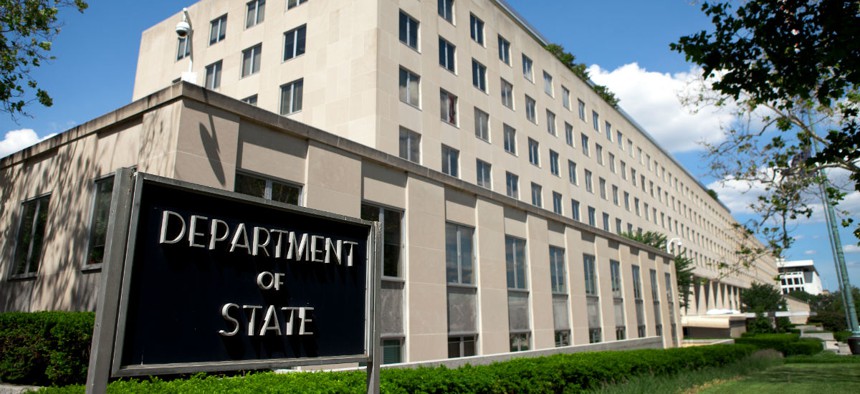
Mark Van Scyoc /Shutterstock.com
State Department Leaders Inaugurate New ‘Lessons Learned’ Center
Foreign Service Institute offshoot will prepare diplomats for a complex future.
The “secret channel” that led to last fall’s nuclear deal with Iran “was not the first of its kind, but it felt that way,” said William Burns, the former deputy secretary of State who returned to the department on Tuesday for a special event.
A perceived decline in the relevancy America’s diplomatic tools over the past decade is one reason the State Department and its Foreign Service Institute marked the opening, after two years of preparation, of its Center for the Study of the Conduct of Diplomacy.
Based in Arlington, Va., the center will provide mid-career officials the opportunity to benefit from lessons learned and best practices by drawing on diplomatic correspondence, open-source materials and interviews to analyze how U.S. diplomats execute policy, according to the department’s materials: “While the research conducted at the center will be available to foreign policy trainers and decision makers alike, the center’s primary focus is to help the Foreign Service Institute develop the savvy, flexible Foreign Service that America needs.”
Burns, a 33-year career diplomat and now president of the Carnegie Endowment for International Peace, signed off on the center’s creation. “Our diplomats are delivering,” he said, citing not only the Iran deal but other controversial Obama administration initiatives such as the recent Paris climate change agreement, the Trans Pacific Partnership trade deal and the opening of relations with Cuba.
“But we can’t afford to rest on our laurels,” Burns told the gathering of employees, fellows and former government officials in the department’s Benjamin Franklin reception room. “We need perspective and innovation,” he added. “To adapt to the new century, we have an obligation to the American people to stay ahead of the curve, to adopt new technology, to ask what we got right and what we got wrong.”
Learning lessons, Burns said, will also help the diplomatic corps retain the backing of Congress and the public. “We have to keep up the pace, be better and do better. I am very optimistic about the future of our profession, the future of the service, the country and its role in the world.”
Burns’ successor, Deputy Secretary of State Antony Blinken, who came on in December 2014, praised Burns’ impact on the department, saying he and colleagues keep a sign in the office reading “WWBD,” for “What would Bill do?”
Blinken reeled off a list of challenges for the 73,000-employee department—confronting ISIS, containing Ebola, revitalizing NATO, supporting Ukraine and countering Putin, as well as deepening ties with nations in Asia and Africa. Citing Benjamin Franklin as “our first diplomat and our most eccentric,” Blinken said, “Diplomacy is not isolation but immersion in global affairs. When I hear that America is somehow on the retreat, abdicating its responsibility to lead, I couldn’t disagree more,” he said.
“Imagine where the world would be without American leadership,” he said, channeling the angel character in the classic movie “It’s a Wonderful Life.” “The debate is not whether we lead but how,” he said, calling for leadership that draws on the military, diplomacy, alliances and the example of our values.
21st century diplomacy, however, must respond to rapid changes in technology and science, from cyberspace to outer space, he said. The new center will help diplomats “see around the innovation corner” in such areas as artificial intelligence, robotics and new currencies.
The State Department “has changed in the past decade,” Blinken said. Employees and Foreign Service Officers “used to come straight from school, but now many have had full careers” as lawyers, soldiers, activists, aid workers and doctors who “felt the calling,” he said. “The experience these new officers bring enriches the department” and increases its relevance to the problems that need tackling.
Nancy McEldowney, director of the Foreign Service Institute, said the Center for the Study of the Conduct of Diplomacy will “make sure the department is ready for whatever challenges await us in the world.” It will benefit from input from current and former Foreign Service Officers, corporations, academia, policy groups and philanthropy organizations, she said, thanking the Una Chapman Cox Foundation for support.
(Image via Mark Van Scyoc /Shutterstock.com)







